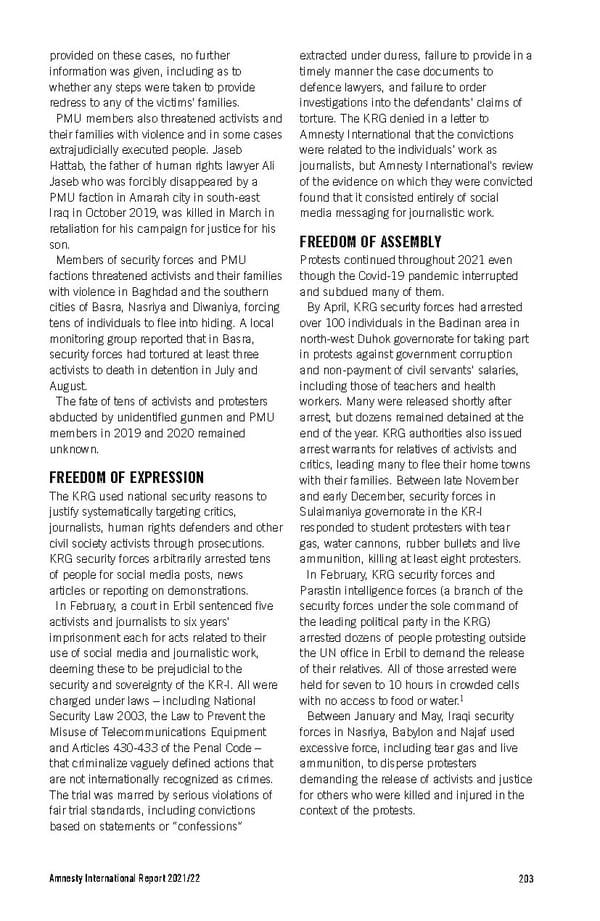provided on these cases, no further extracted under duress, failure to provide in a information was given, including as to timely manner the case documents to whether any steps were taken to provide defence lawyers, and failure to order redress to any of the victims’ families. investigations into the defendants’ claims of PMU members also threatened activists and torture. The KRG denied in a letter to their families with violence and in some cases Amnesty International that the convictions extrajudicially executed people. Jaseb were related to the individuals’ work as Hattab, the father of human rights lawyer Ali journalists, but Amnesty International’s review Jaseb who was forcibly disappeared by a of the evidence on which they were convicted PMU faction in Amarah city in south-east found that it consisted entirely of social Iraq in October 2019, was killed in March in media messaging for journalistic work. retaliation for his campaign for justice for his FREEDOM OF ASSEMBLY son. Members of security forces and PMU Protests continued throughout 2021 even factions threatened activists and their families though the Covid-19 pandemic interrupted with violence in Baghdad and the southern and subdued many of them. cities of Basra, Nasriya and Diwaniya, forcing By April, KRG security forces had arrested tens of individuals to flee into hiding. A local over 100 individuals in the Badinan area in monitoring group reported that in Basra, north-west Duhok governorate for taking part security forces had tortured at least three in protests against government corruption activists to death in detention in July and and non-payment of civil servants’ salaries, August. including those of teachers and health The fate of tens of activists and protesters workers. Many were released shortly after abducted by unidentified gunmen and PMU arrest, but dozens remained detained at the members in 2019 and 2020 remained end of the year. KRG authorities also issued unknown. arrest warrants for relatives of activists and FREEDOM OF EXPRESSION critics, leading many to flee their home towns with their families. Between late November The KRG used national security reasons to and early December, security forces in justify systematically targeting critics, Sulaimaniya governorate in the KR-I journalists, human rights defenders and other responded to student protesters with tear civil society activists through prosecutions. gas, water cannons, rubber bullets and live KRG security forces arbitrarily arrested tens ammunition, killing at least eight protesters. of people for social media posts, news In February, KRG security forces and articles or reporting on demonstrations. Parastin intelligence forces (a branch of the In February, a court in Erbil sentenced five security forces under the sole command of activists and journalists to six years’ the leading political party in the KRG) imprisonment each for acts related to their arrested dozens of people protesting outside use of social media and journalistic work, the UN office in Erbil to demand the release deeming these to be prejudicial to the of their relatives. All of those arrested were security and sovereignty of the KR-I. All were held for seven to 10 hours in crowded cells charged under laws – including National with no access to food or water.1 Security Law 2003, the Law to Prevent the Between January and May, Iraqi security Misuse of Telecommunications Equipment forces in Nasriya, Babylon and Najaf used and Articles 430-433 of the Penal Code – excessive force, including tear gas and live that criminalize vaguely defined actions that ammunition, to disperse protesters are not internationally recognized as crimes. demanding the release of activists and justice The trial was marred by serious violations of for others who were killed and injured in the fair trial standards, including convictions context of the protests. based on statements or “confessions” Amnesty International Report 2021/22 203
 Amnesty International Report 2021/22 Page 202 Page 204
Amnesty International Report 2021/22 Page 202 Page 204